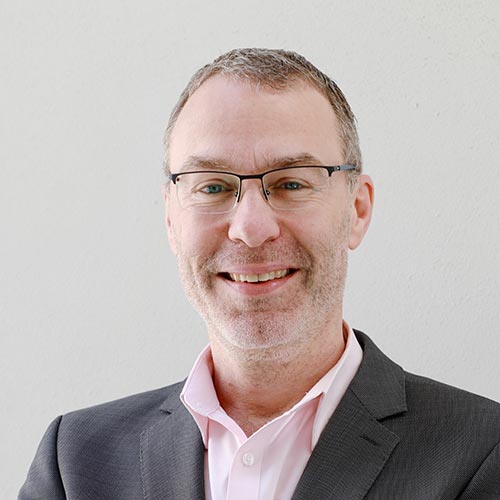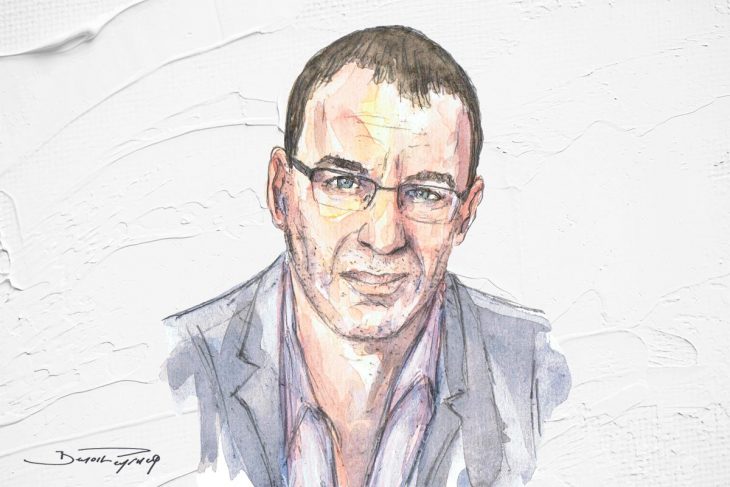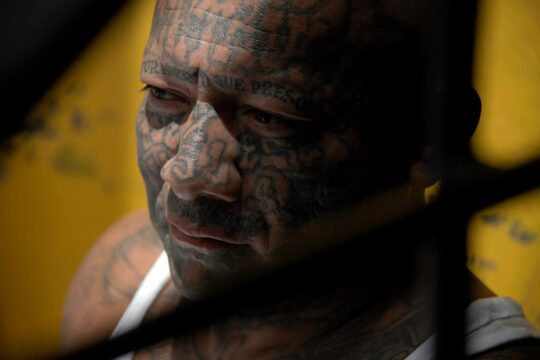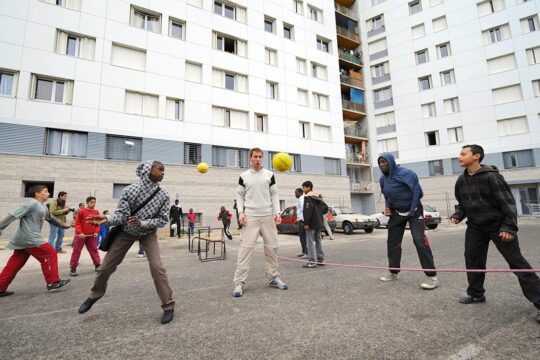JUSTICE INFO IN-DEPTH INTERVIEWS
Philip Grant
Director of TRIAL International
Philip Grant, director of TRIAL International, a Swiss NGO that was created 20 years ago, talks to us about the development of universal jurisdiction, the value of national trials in the Democratic Republic of Congo, and how he sees the future of international justice.
JUSTICE INFO: Universal jurisdiction has been growing for some 20 years, and it seems to have gained some traction in recent years. What do you think is making it more attractive now?
PHILIP GRANT: I like to say there have been different periods: universal jurisdiction 1.0, then 2.0, and now we are, I think, in 3.0. I’d say 1.0 was the Pinochet precedent [In 1998, former Chilean dictator Augusto Pinochet was arrested in the UK on an arrest warrant issued by a Spanish judge]. What happened after that was a flow of cases trying to target high-level suspects – presidents, ministers, heads of armies and so on, cases that probably had no chance of going ahead and which triggered after some time a big political backlash from powerful countries, particularly the US, Israel and others. That period was like a free-for-all period where everything was possible, at least in theory, and it led to universal jurisdiction 2.0, which was the backlash – changes in legislation in Spain, Belgium, Switzerland and elsewhere, and a lot of pressure from political powers –, which yielded very little concrete cases. And then, ten years ago, I would say we stepped into universal jurisdiction 3.0.
The reasons, I guess, are multiple. You had a lot of countries implementing the International Criminal Court (ICC) Statute in their national legislation and to a large extent giving themselves extraterritorial jurisdiction over these crimes. You had the creation of [national] war crimes units and the setting up of coordinating institutions like the Genocide Network. You had to some extent the specialization of NGOs as well, with them being able to go on the ground and come back with a lot of evidence – what it takes to at least open up a case. And then you had the flow of refugees from Syria which probably changed the dynamics. Of course, there were a lot of refugees, but along the way perpetrators as well.
it's a mix of different elements that has been setting the stage for a revival in universal jurisdiction.
There's also the fact that the ICC, which was perceived at least in the beginning as the institution that would be bringing justice to the victims, has not lived up to expectations. So it's a mix of different elements that has been setting the stage for a revival in universal jurisdiction.
What do you identify as the limits that are inherent to the concept?
I think there are perceived limits and real ones. There is a perception in some quarters that universal jurisdiction is a neo-colonial concept, that it's impossible for a foreign judge to understand what goes on in a country far away, where all the evidence lies, and that there are all these cultural barriers. But there are a lot of national cases in other areas – corruption involving foreign officials, female genital mutilation, for example – where you need to investigate outside of your borders and which raise cultural and religious issues. So I don't think this is a true limitation.
Another limitation, which is a little bit perceived as well but there might be more truth to it, is the fact that universal jurisdiction has difficulty going after powerful people. If what you have in mind is going after the George W. Bushes of today, I think yes, there's a limitation. But at some point – we're talking years, if not decades – we will get to that. We're starting to see in some of these cases interior ministers being arrested, vice-presidents of countries being put under investigation. We are also seeing corporate actors being targeted, such as a Swiss executive in the Lundin case. So I think there's a shift.
I think one of the main limitations that you see is when the State whose citizen is being targeted by the legal process clearly wants to go after the witnesses, wants to go after the victims. It's very difficult to protect victims who are residing in the country where the crimes were committed if you're the prosecuting authority and give guarantees that they will be safe. Let's take Iran. When in retaliation Iran decides to snatch Swedish nationals on its territory and bring bogus claims that they've been spying or whatever, it does jeopardize the process and make it very difficult.
Which case are you referring to?
The Hamid Nouri case [a former Iranian prison official tried for war crimes in Sweden]. The foreign minister of Iran was making claims every other day that Sweden must free him immediately and a Swedish foreigner was arrested in Iran around the time of the ruling [Noury was given a life sentence on July 14 for his part in the mass torture and execution of prisoners in the 1980s].
Another limitation, perhaps more theoretical, would be prosecutions that would only go after one side in a conflict, especially against the weaker side. We could take Turkey and the PKK [Kurdistan Workers’ Party, a political and armed guerilla movement], Sri Lanka and Tamil fighters, or even today Russians and Ukrainians. It's ingrained in the concept that there could be a risk of that sort.
I think we're gently moving in a more positive direction. In terms of trends, we are going to see prosecutions also of Western economic actors.
Isn't it actually the situation that it’s only weak individuals coming from poor countries or pariah states that are being subject to universal jurisdiction? For example, Anwar Raslan who left Syria after serving the Assad regime.
Well, by definition there are limitations ingrained in the system. You usually will not go after a sitting head of state or sitting foreign minister or head of government. That is just legally not possible. Then you have to put your hands on the suspect at some point, and that's also difficult.
I think we're gently moving in a more positive direction. In terms of trends, we are going to see prosecutions also of Western economic actors. The Lundin case in Sweden, for example, where a Swiss executive will be brought to court based on universal jurisdiction for alleged war crimes committed in Sudan, that's something that could not even be imagined a few years ago. He's a non-resident and a non-citizen of Sweden who committed crimes abroad. And the Swedish Supreme Court recently decided that the link is sufficient to make this case possible before Swedish courts.
Do you see this as a sign that corporate executives might be actually much more vulnerable to this kind of prosecution than politicians?
What I'm trying to understand is the trends. We've moved from trying to get the big guys to building a sustainable system where one question at a time, one case at a time are being resolved. The immunity questions – like we had with the Khaled Nezzar [a former Algerian minister of defense] case here in Switzerland -- need to be settled for you to at some point go after the George W. Bushes of tomorrow.
Universal jurisdiction is not a substitute for fair trials happening on the ground, it's a substitute for nothing happening at all.
Let’s go back to the “perceived” view that universal jurisdiction is post-colonial. There has been criticism of international tribunals like the International Criminal Tribunal for Rwanda for being too far removed from the realities of the country and its history. Why wouldn't the criticism be relevant to universal jurisdiction situations where we see in many of these trials a low level of knowledge and understanding in those responsible for trying individuals?
Well, that's a bit of a broad statement. But if you're hinting at the fact that those trials are more legitimate when they happen on the ground, I agree. Universal jurisdiction is not a substitute for fair trials happening on the ground, it's a substitute for nothing happening at all. Those cases are not dealt with at the national level. So that's part of the understanding of universal jurisdiction – not as a substitute but as a way to bridge an immense impunity gap. And what we hear from all the victims we've ever worked with on universal jurisdiction cases is that they say we trust your system way more than we would trust ours to handle these cases.
Had you got a functioning Liberian judiciary with an experience and an expertise and a track record of dealing with Liberian war crimes cases, nobody would say France has to do these cases. They would be very happy with them being handled at the national level. If you have cases in Switzerland and France, that points to the lack of justice in Liberia itself.
Switzerland’s is one of more than 15 countries where national prosecutors have now set up a special unit to gather evidence from refugees for possible future cases on crimes commited in Ukraine. Do you think that Ukraine is giving a new impetus to the debate on universal jurisdiction?
I think it's accelerating this revival of universal jurisdiction. Institutionally speaking, you're seeing a lot more reference to universal jurisdiction by international institutions, be it the European Court of Human Rights, recommendations from commissions of inquiry to the Human Rights Council. Universal jurisdiction is put on the table as a possible tool to bridge the impunity gap, and Ukraine has really given it a boost. But a lot still needs to be done. We need to get serious about a number of things, not only mentioning universal jurisdiction, but implementing legislation that will allow for universal jurisdiction to unfold in a fair way.
You take Italy, for example, the country where the [ICC] Rome Statute was adopted. Italy has still not implemented the Rome Statute. So this is a bit of a joke. If you want to get serious about accountability, you need to upgrade your legal system pretty quickly, you need to work on setting up war crimes units that will have the required expertise to deal with these cases. It's easier said than done, of course, but I hope the Ukraine crisis will push in that direction a number of states to upgrade their legal framework and their institutional capacity.
Could it be a case where the role of NGOs might be lesser because there is stronger political will in all those states to have Ukrainian prosecutions?
I think you have a point and it's a two twofold question. The first one is the capacity for NGOs to be massively reactive in the absence of suspects that might trigger a response from them. Apart from one or two defectors, we're not seeing a lot of people who might be the target of NGO investigations. And we are to some extent also seeing states saying we're in charge now, we don't need you as much. But that was the initial response and there is probably now more discussion, especially if you think about Ukrainian NGOs, of course, who are doing a huge amount of work on investigations and evidence gathering.
With regard to the international NGOs, there was some competition in play. I'm seeing a little bit of a shift now to more cooperation and, as the war drags on, the need to be open to various solutions, including universal jurisdiction or extraterritorial jurisdiction.
Do you see any risk that all the attention on Ukraine could be to the detriment of other universal jurisdiction cases?
I think there's a risk of taking resources from other cases and situations and putting all of the emphasis on Ukraine, yes. Switzerland is setting up a unit on Ukraine – why just Ukraine? But in the long run it will even out. Bureaucracies also have a way of legitimizing their existence, so even if Ukraine kind of fizzles out at some point, those task forces, those mechanisms, the revision of the legal frameworks will at some point also be used.
Does it make sense to you to have a special tribunal for aggression as some are advocating for Ukraine?
With the legal framework and institutions we have in place, it’s pretty much a crime without a court. So the question is whether that crime needs to have a court. And I don't know. I think it depends if you see the glass half full or half empty. The half empty glass would be the risk of having a court in place that would be politicized, only there to judge the Russian aggressor and disappear when that is done. Of course, there are a lot of other issues open with regard to other big powers that might have been party to aggressions in the past.
The half full glass looks more like the Nuremberg precedent. It was victor's justice, but what you have when you look back is a set of principles that were very powerful that then helped to lay the groundwork for accountability efforts for the decades to come. So if you have such a court in place, will it be able to render rulings and decisions that will not only apply to Russia but at some point come back to haunt the other big powers?
If you look at the short term, it's an endeavor that is pretty risky in terms of impartiality and independence. But in the longer run, there's a case to be made that such a court could actually bring quite a lot of positive legal developments.
Sometimes it's just intelligent lawyers making sure prosecutors will have the relevant evidence and strategy to go ahead.
Although it’s not universal jurisdiction, a major part of the work that TRIAL has been doing is supporting local trials in the Democratic Republic of Congo (DRC). It's been a rather significant process if you consider that more than 50 individuals were tried for war crimes, crimes against humanity in a country where the environment can hardly be more hostile to holding trials. Is there anything that you've learned specifically from the experience?
We’ve been very active mainly in South Kivu province, a bit in North Kivu and now increasingly in Kasai-Central, so I'm not painting a full picture of what's going on in the DRC. That said, there are a number of conditions that need to be met for justice to happen and not in a perfect manner. If you strive to have the perfect trials that will answer every single legal condition, it's not going to happen, so you have to deal with what you have.
It's a big puzzle with multiple pieces. First you need to have adequate national legislation – that is not specific to the DRC – but you also need to have at least some engagement from the authorities that institutions will be there to be able to hold these trials. And in most of the cases we've been dealing with, communities might never have seen a judge, a prosecutor, sometimes even a police officer in their midst. So it is having institutions that are willing to go the extra physical mile to get to where the crimes were committed.
There needs to be a strategy in place, and it's a strategy that is shared by various actors, international as well as national actors. It’s NGOs as well as authorities coming around the table to discuss what the most urgent and important cases are, what the material settings of these cases should be, paying the salaries, getting the courts to specific places, having the security and the soldiers that can guard the premises, making sure the victims are accompanied when they come to court and are secured during the trials.
It's a number of elements that need to come together at the right moment and the right place for these cases to happen, and sometimes it's a bit of legal technique and expertise and flair that will make a particular case a successful one. Sometimes it's just intelligent lawyers making sure prosecutors will have the relevant evidence and strategy to go ahead.
Equating a military court with creativity is quite a feat, but we've seen some quite creative thinking from the Congolese military courts.
Do you see any jurisprudence coming out of it that is interesting when it comes to things like indigenous people's rights and environmental issues?
Yes. Equating a military court with creativity is quite a feat, and it's not something that we were hoping for to start with. But we've seen some quite creative thinking from the Congolese military courts. For example, local parliamentarians enjoy immunity from prosecution based on the national legal framework, but courts have got that immunity set aside with reference to the ICC Statute. Or in terms of reparations, all of a sudden a military court said the government should be held accountable for its failure to protect and to anticipate attacks from rebel groups, so we have cases against rebel commanders ending up with the government having to pay reparations because they failed to prevent or provide medical support to victims.
And then in the middle of nowhere in the DRC, you have military courts trying to be creative on the environment. We've seen recent cases in which the destruction of the environment was part of the prosecutors’ strategy. It happened in one of the cases that we had in South Kivu. In the end, unfortunately, the crimes against the environment were not recognized as a war crime but as a violation of national law. But there is jurisprudence that is indeed emerging that rebel groups cannot commit environmental crimes alongside all the other crimes that they commit. So there's a case to be made that even though it's not, you might say, like the dream of a Western scholar, there are quite a lot of things emerging that should give rise to a lot of interest.
Is there a bit of frustration for you that it's not recognized as a significant, important, valuable jurisprudence coming out of these trials because they're remote and not what law schools and the international lawyers value?
We're in part probably responsible for that, we should probably put more means into getting the word out. But yes, what is often regrettable is the lack of consideration for local rulings in comparison to international. There is quite a lot to register from what's going on at the local level. And that's the beauty of the law with these individual cases. They're not only in some instances being referred to by outside actors, but also they become the law of the land if they are seen as well adjudicated. And there is also potential for other provinces in the DRC to use those rulings as precedents.
International lawyers and international human rights organizations haven’t seemed to be interested in reparations. However, a couple of years ago, with the decline of international criminal justice, more attention seemed to be paid to reparations. Do you see this?
It's a bit the reflection, maybe from a lawyerly perspective, that reparations are less impactful than criminal trials in the sense that they do not give rise to rulings that will stand out as principles and precedents. You cannot knock out a former dictator through a reparation process.
We've put a lot of emphasis on reparations and especially trying to get reparations as part of the criminal process. We managed to do that in Bosnia, to have victims of sexual violence being able to claim reparations during the criminal trial. But I guess one of the aspects is the fact that once you get your reparation measures, your ruling, you often have to re-litigate the case just to have it implemented. So it's another obstacle, and often very time consuming. Sometimes you do get reparations at the end of the day, in whatever form – financial, medical and so on. But it's something that we're probably a little bit afraid to promise, because it's hard.
So we need to put in place other reparations schemes, more administrative-based than criminal-based measures, in particular the Global Survivors Fund for Victims of Sexual Violence. I think what's happening is that on the individual level, it's really, really complicated. It's much more than getting the bad guy sentenced to jail.
What fascinates me or what we need to think about is the second circle of perpetrators outside the direct ones: all the enablers, the facilitators, those who in the corporate realm and even the cultural realm might make it possible for crimes to happen
What is it that excites you at the moment in the field of international justice?
We mentioned some things like the role of protection of the environment in conflict. I also think the question of mercenaries and private military companies will be one that will probably gain a lot of traction in the future. What fascinates me or what we need to think about is the second circle of perpetrators outside the direct ones: all the enablers, the facilitators, those who in the corporate realm and even the cultural realm might make it possible for crimes to happen because they are, for example, buying cultural artefacts that have been pillaged and make it possible for groups to access global markets and make money out of the pillaging that will then fuel the conflict. There's a huge field that needs to be opened on how to get to the enablers, the facilitators.
And then the question, I think more in terms of tools, is what we can do with new technology, not just to document and safeguard evidence, but to track the suspects, the hundreds, probably thousands of perpetrators residing on the territory of countries that could exercise universal jurisdiction. There is only a very limited number of them that come to the attention of the authorities, through NGOs or others. But might new technologies be able to better locate suspects? That's one thing that we'll probably find out soon.

Philip Grant is the founder and director of TRIAL International, an anti-impunity NGO based in Geneva, Switzerland, since 2002. His qualifications include a degree in Law, a Masters in International Humanitarian Law and a PhD in Constitutional Law. He has just been awarded an honorary degree from the Swiss University of Basel in recognition of his work at TRIAL International. Prior to founding TRIAL, he worked as an attorney in a Geneva law firm. He has been active since his teens in various organizations working on human rights issues, racism, refugees and the right to conscientious objection.





